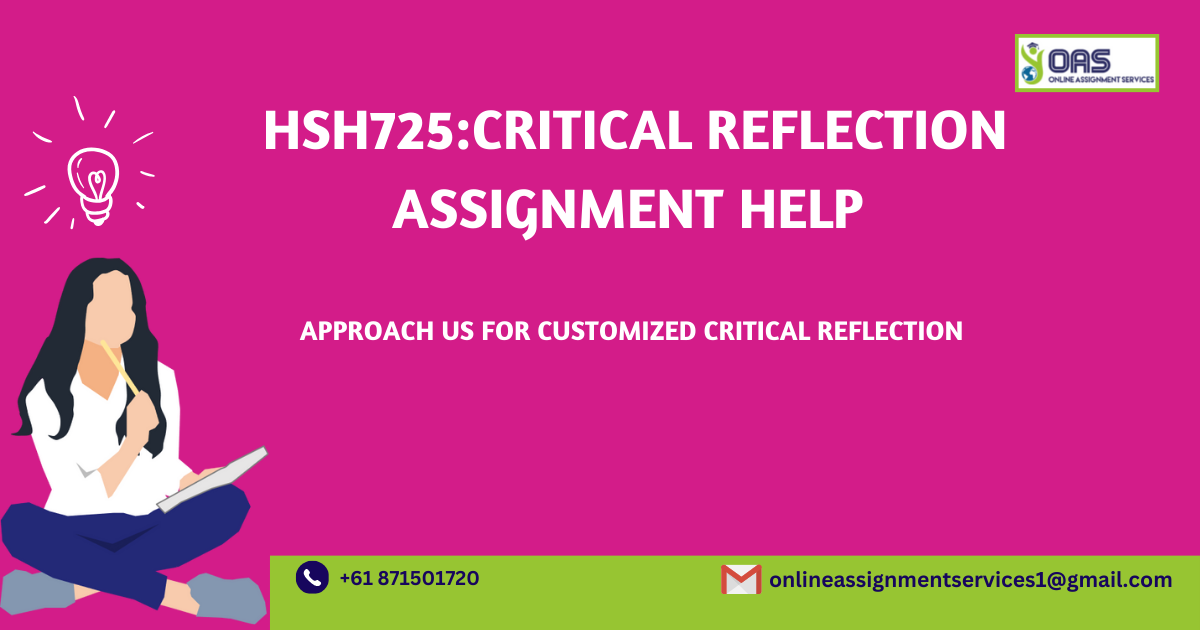HSH725:Critical Reflection Assignment Help

The Question:
HSH725: This assignment is based on a critical reflection of a case scenario of a research assistant named Anna. The case study revolves around Anna’s attempt to understand the experience of women who have experienced violence and the consequence it can have on their well-being. The population of interest for her study are women from culturally and linguistically diverse backgrounds. The assignment requires the students to critically reflect and identify three and procedures that Anna needs to adhere to in her work- one inclusive, one cultural and one ethical principle based on the case. It also involves a reflection on the choice of each principle, and explanation of associated practices to ensure there is no harm to the recruits.
The Solution:
The solution is structured into three segments: An introduction, a reflection on the case scenario, and a conclusion.
The introduction provides a brief overview of Anna’s case study, the aim of the assignment and how the reflection would be structured. The sample introduction given demonstrates our expert’s ability to craft a clear and well-structured opening section.
Introduction:
The chosen scenario is the first one involving research assistant Anna engaging with women who have experienced family and domestic violence (FDV) where some of them are from Culturally and Linguistically Diverse (CALD) backgrounds. The purpose of this reflection is to identify cultural, inclusive and ethically sensitive principles and practices that I can adopt as a healthcare professional (HCP).
This is a partial introduction shared for guidance purposes. For the full version, please contact us via WhatsApp at +44 7956859420.

The reflection section required the students to highlight how they underwent critical thinking for the case of Anna’s research work.
Our Experts have illustrated the critical reflection by highlighting three principles—inclusive, cultural, and ethical in the following sample of the reflection section, drawing insights from Anna’s case scenario. This serves as a helpful guide for students who are attempting to reflect on these principles in the context of the case scenario.
Reflection:
Cultural sensitivity
Cultural sensitivity is defined as the ability to understand and respect the beliefs, values and practices of a particular culture or community without assigning them a right or wrong value (Boeijen & Zijlstra, 2020). It is important for HCPs to be culturally sensitive in their practice to provide culturally competent care and to reduce disparities in health and care outcomes for clients from marginalized backgrounds (Purnell, 2016). Marginalized communities like CALD generally comprise of indigenous people, refugees, migrants and people from diverse religious and cultural backgrounds due to which these communities often have different values, beliefs, customs and language (Ghafournia & Easteal, 2018). The significance of ‘cultural sensitivity’ in the given scenario is that the cultural values, beliefs, and norms of CALD communities can affect how FDV survivors from the CALD community respond to the care provided by Anna.
Additionally, since Anna’s research is focused on women participants only, hence her engagement with the participants has to be extremely sensitive. This is also important because women from CALD communities are prone to FDVs due to traditional gender roles and cultural expectations around the family structure (Ghafournia & Easteal, 2018). Due to these reasons, it is crucial for Anna to provide the participants from CALD communities more support and non-judgmental services during her research. Hence, the advice that I would give Anna while engaging in this research is to be culturally sensitive towards women.
Some associated practices on which I would advise Anna so that there is no harm to the participants includes developing a culturally-sensitive research design by incorporating valuable insights from advisors who are familiar with the culture and values of the CALD community. This is important because failure to take into account the cultural differences of the participants can result in the researcher inadvertently raising topics that might be considered inappropriate or misunderstood as offensive in the CALD community (Harrison et al., 2020). I would also suggest Anna to be aware of any potential language barriers that may exist and ensure that the participants have access to interpreters or translation services whenever necessary. This is important because language barriers can also be a cause of miscommunication and misinterpretation leading to a lack of engagement from the CALD community (Hughson et al., 2016). For instance, instead of referring to the participants as ‘poor’, researchers can utilize the phrase ‘people experiencing financial disadvantage’. These seemingly trivial adaptations while conversing with marginalized communities can create an atmosphere of mutual understanding and respect during the research.
Want to read the remaining two principles as well? Give us a call at +61 871501720.

